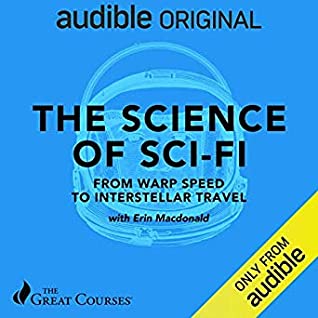- The Good: Accessible and fun physics lectures (no formulas!) based around your favorite scifi movies and shows
- The Bad: Light on the science; light on the science fiction
- The Literary: A few bookish classic scifi concepts are presented
Professor Erin Macdonald presents ten very fun lectures on the hard science behind many of our favorite science fiction stories. Beginning with some foundational physics like motion, gravity, and relativity, she also tackles black holes, warp drive, and interstellar travel. You can tell from her narration that Dr. Macdonald is very passionate about science fiction and science. Her delivery is a perfect combination of articulate and nerdy, and the content is especially accessible. The lectures are bite-sized and she does a great job of summarizing fundamentals and emphasizing the bottom line of the science throughout.
Once the lectures move beyond the basics, pop science fiction concepts from Star Trek, Star Wars, Mass Effect, Galaxy Quest, Futurama, and more are explored, defining what is science fact and what is science fiction. For example, in the movie The Martian a wind storm separates Mark Watney from his crew, but in fact, the thin atmosphere and fine particles of Mars don’t have the capability to cause wind damage. Macdonald doesn’t just nay-say your favorite shows and movies though, she revels in the interesting interpretations and workarounds. For instance, in Star Trek the transporter technology wouldn’t really work, but the writers introduced the “Heisenberg compensator” so the transporter could accurately detect all the particles’ exact velocity and location of the item it’s transporting.
Unfortunately, if you’re familiar with basic physics or follow pop physics, most of the concepts are a little introductory. And if you’re a science fiction nerd, you may also be disappointed in examples. Most of the scifi explores tv shows and movies, but is lacking when it comes to books. She mentions Heinlein’s time travel and LeGuin’s ansible, but I would love some more deep cuts. Despite the lectures being more edu-tainment than educational, I still really appreciate the joy and purpose that Macdonald brings to the subject. Science fiction pushes scientific boundaries in ways that science cannot, and gives everyone the chance to see other worlds.
Highly recommended as an entry point for fans of scifi movies into the science behind it!
